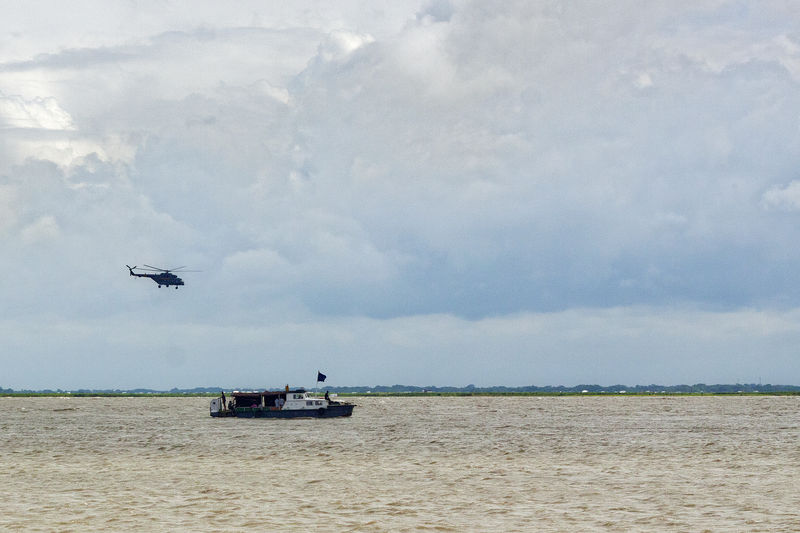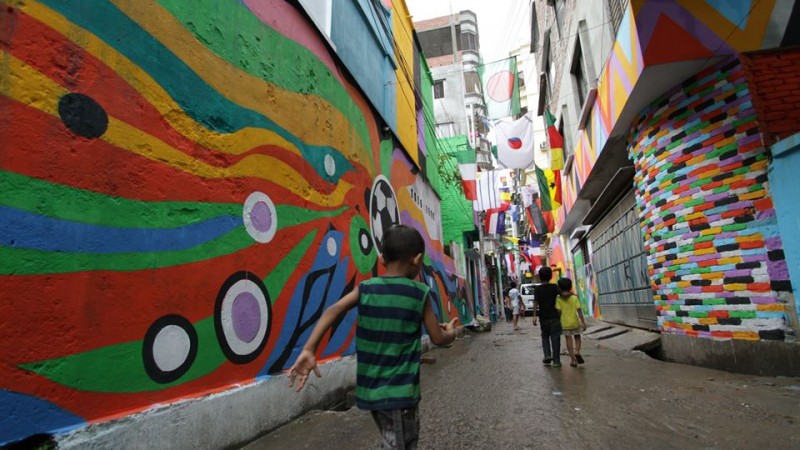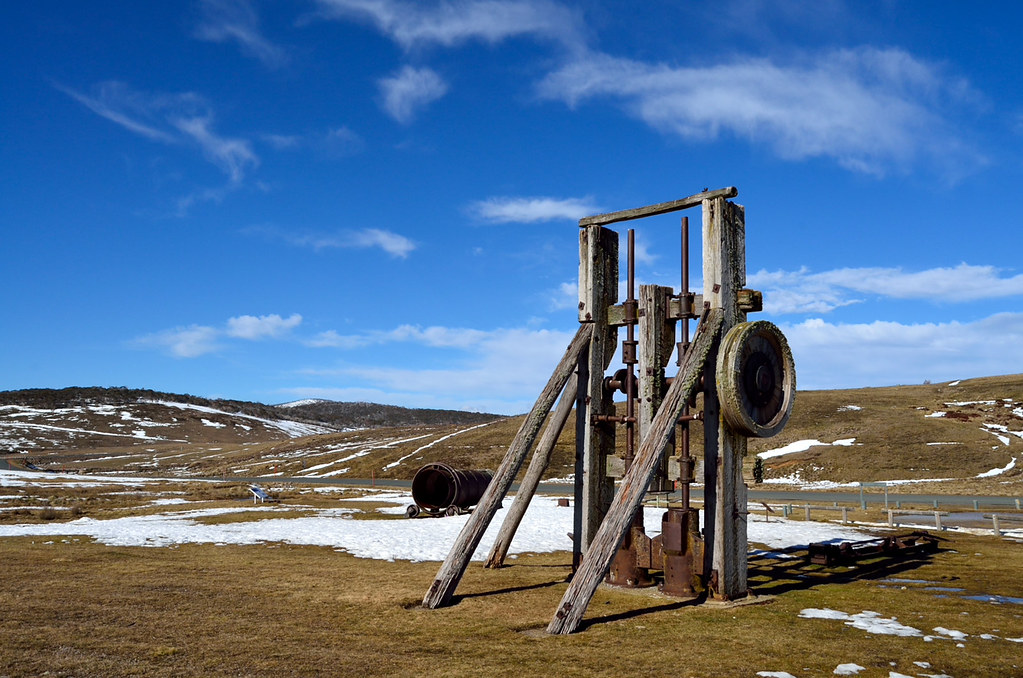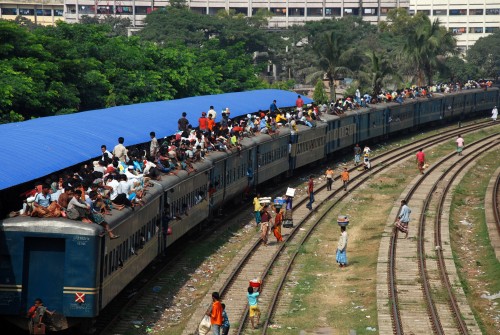Dragonfly
Image by Rezwan
The World Cup Goal-E Project
This street in Bangladesh has a colorful world cup celebration
New Chum Hill Ruins
Remnants of Kiandra gold mine at New Chum Hill, #nsw #australia
September 14, 2011
September 09, 2011
The Facebook Status Controversy
Facebook is becoming a popular social media in Bangladesh like the rest of the world. It is not only limited to interaction between friends but also used as an useful tool to disseminate news and information. More importantly Facebook is also being used to discuss political views.
Bangladeshi Facebook users frequently express their opinions, anger, rights, likes and dislikes and some of them are filled with emotions. Once someone posted this status in a Facebook wall which became viral: “I may be poor, but I have a Status”. Now this slogan also has a separate Facebook page.
But sometime your Facebook status can bring peril. Ruhul Amin recently has been in trouble because of his Facebook status. The recent death of prodigies Tareq Masud and Ashfaque Munier in a road accident has lead many users venting their reactions and anger in Facebook. Ruhul also expressed his strong reactions which led to actions against him as initiated by the Bangladesh High Court.
What was Ruhul's status? BDNews24blog [bn] quotes from the web news network BDNEWS24.com:
The post at BDNews24blog attracted many comments [bn]. Some supported Ruhul and some had other ideas.
Rabbani said:
Anik Iqbal is a blogger. He posted in a group mail of the students of Jahangir Nagar University (published with permission):
This post was originally written in Bangla by Bijoy in GV Bangla. Translated by me for Global Voices.Bangladeshi Facebook users frequently express their opinions, anger, rights, likes and dislikes and some of them are filled with emotions. Once someone posted this status in a Facebook wall which became viral: “I may be poor, but I have a Status”. Now this slogan also has a separate Facebook page.
 |
| Image by Flickr user Christy Sheffield. CC By-NC 2.0 |
What was Ruhul's status? BDNews24blog [bn] quotes from the web news network BDNEWS24.com:
The Highcourt has asked why Ruhul Amin Khondker, a teacher living abroad, won't be brought to justice because he expressed that the Prime Minister should die.The blog informs:
Ruhul, a lecturer of The Institute of Information Technology of Jahangirnagar University is now on a study leave in Australia. Ruhul had posted a Facebook status where he expressed “why the prime minister do not die”. This was prompted by the reaction to the death of five persons including internationally renowned filmmaker Tareq Masud and the CEO of the TV channel ATN News Ashfaq (Mishuk) Munier in a road accident near Manikganj. A local newspaper carried the story on the Facebook status of the teacher. The court learned the news and took a Suo motu action.The main anger behind the status is the reaction to the news [bn] that the Shipping Minister had requested the Roads and Highways Minister that 21000 applicants (some claim 24000 people) should be provided [bn] driving license without completing all the tests (since many are not literate enough).
Mr. Ruhul posted two statuses on his wall. He wrote on Saturday 7.40 pm: “the consequence of issuing driving license without written exam - five dead including Tareque and Mishuk Munier. Everybody dies except the prime minister”. Another status on Sunday morning at 4:59 am read: “Driving License without written exam? Can you imagine this in any civilized society? Where the whole world is becoming strict on issuing driving license, the Hasina government is issuing license without examination.”
The post at BDNews24blog attracted many comments [bn]. Some supported Ruhul and some had other ideas.
Rabbani said:
I also support Ruhul's status and term the rule of the highcourt as a misuse of power and rule of law and it is agaisnt the human rights of common people. Ruhul with his words has protested against the negligence of the political leaders about the 12000 deaths on the road each year.Mohammad Morshed Alam thinks this law is a blow to the freedom of speech. He comments:
Isn't attack on freedom of speech against democracy? Hasn't this weakened the trust on our judicial system? Dear judges - please refrain from taking away the hast hope of the citizens. (Friday the 19th of August)Mohsin Rahman says:
The teacher commented from his personal anger which in fact reflects many citizen's thoughts. What the teacher couldn't do was achieved by those judges. The issue has been highlighted and publicized by the media. (Friday the 19th of August)Hasan says:
I fear to comment on this, if accusations against me are brought for contempt of court! :P (Friday the 19th of August)Ratan Adhikary says these comments are out of line. He says:
This is way out of line. What Part-time lecturer Muhammad Ruhul Amin Khondoker said cannot be supported in any way. We hope Mr. Ruhul and his supporters become aware of their behavior. (Friday the 19th of August)Netpoka says:
This type of comment is very indecent. But on what basis is this against the law, can anyone tell? (Friday the 19th of August)
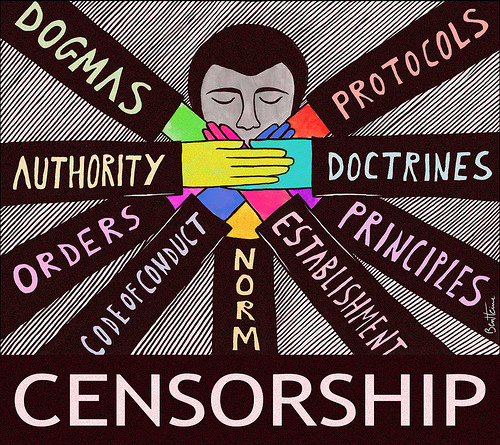 |
| Extreme regulations lead to censorship. Image by Flickr user publik15 (CC BY 2.0). |
I am interested to see whether government can really strongly build the case and justify their argument. but if they decide to go for it, a lot will be at stake. the government's character as the protector of its citizens' personal rights will be in question. again, their attitude might be termed as oppression and silencing people's opinions by force. whether or not they win the case, chances are that it will damage their image, which is already in jeopardy.Ruhul Amin gave an interview via email to Bangla News [bn] where he provided the context of his statements:
Dear brothers and sisters:He added:
I should not reiterate what we have lost in the tragic death of Tareq Masud and Mishuk Munier. The day they died I was reading online versions of Bangladeshi newspapers. I also tried to find other news items on this. I was moved by the hundreds of comments left on those news items. I was so full of emotion, I compiled some of the quotes and posted in my status.
I say without any hesitation that I do not have any personal grudge against the Prime Minister and do not pose any threat against her by my status in any manner. I just wanted to share with my friends the reactions of common people on that road accident. So by terming this statement as completely my own statement is against the truth. I have trust on my Prime Minister, especially as a teacher of an independent university. Moreover, if that status hurt others feeling I am truly sorry for that.Ruhul ends with this:
The misinterpretation of the status has lead to unwanted consequences. I hope the unfortunate matter will end here.Anik conludes:
I am keenly following the developments. this case, at the least, will decide the future of the flourishing of electronic media and define people's right to share their opinions over this very modern and powerful medium.
September 01, 2011
Bangladesh: Coming Home For Eid
Eid is the biggest religious festival in the Muslim majority country Bangladesh, and a key part of the celebration is going home to celebrate with family in distant places.
During Eid, many inhabitants of the capital Dhaka go back to their hometown to spend the holidays with family. Nasirudding Hozza [bn] explains in a post titled “Coming Home For Eid”:
There are no statistics available on how many people return home during Eid. Nasiruddin Hozza mentions that the population of Dhaka is approximately 9.6 million at present. If 40% of them go home then the number can reach 3.5 million.
Facebook user Amanullah bin Mahmud's home town is Sirajganj, far away from Dhaka. He will travel by rented car the day before Eid. But for those who avail public transport, this journey can be a unhappy affair; it's virtually impossible to get tickets, and they have to pay much more.
Uzzal [bn] says in a post titled “My dreams will travel home: on broken roads”:
He also shared his own experience:
And getting a ticket does not confirm that you can reach home. Blogger Mamu [bn] says in a post titled: “In spite of all have to get home”:
Each year there are accidents in roads and rivers and many die as a consequence. In 2009 hundreds of people died as a passenger ship was drowned in the ricer. D. M. Habib [bn] opines that the government is not doing enough:
Nasirudding Hozza [bn] concludes:
During Eid, many inhabitants of the capital Dhaka go back to their hometown to spend the holidays with family. Nasirudding Hozza [bn] explains in a post titled “Coming Home For Eid”:
The majority of residents in Dhaka, who have come here for livelihood, have come from other districts. But they miss their home, where their roots are. Their home can be just in the outskirts of Dhaka or in a distant rural village. During Eid they have to get back their home near or far.
People gather at various train stations in Dhaka to leave the city to celebrate Eid with their friends and families. Image by Saad Shahriar, copyright Demotix (15/11/2010).
There are no statistics available on how many people return home during Eid. Nasiruddin Hozza mentions that the population of Dhaka is approximately 9.6 million at present. If 40% of them go home then the number can reach 3.5 million.
That means Dhaka would be half empty by then. Many people start their journey towards home long before the official Eid holidays. The citizens of Dhaka becomes happy, because the bustling megacity seems less crowded.
Facebook user Amanullah bin Mahmud's home town is Sirajganj, far away from Dhaka. He will travel by rented car the day before Eid. But for those who avail public transport, this journey can be a unhappy affair; it's virtually impossible to get tickets, and they have to pay much more.
Uzzal [bn] says in a post titled “My dreams will travel home: on broken roads”:
No tickets are available for bus train or domestic airlines. Those who with high hope queue for the whole night at the ticket counters are not sure whether they will have the last laugh. After a sleepless night enduring countless mosquito bites, if they really get a ticket, imagine how happy they could be. Only those who have gone through this ordeal will understand. But not everyone is lucky. Tickets are quickly sold out once the counters are open. Many dreamers are left stranded empty handed.
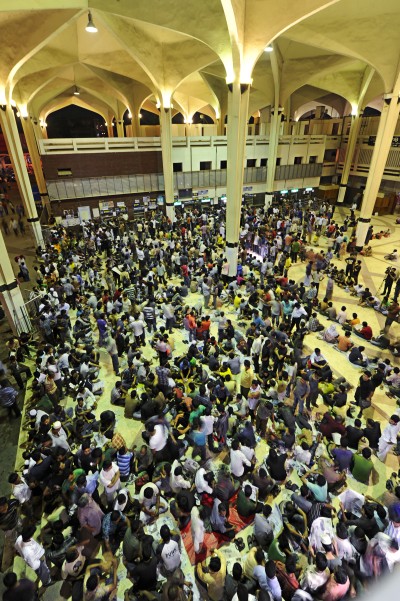 |
| Queue for advance tickets at Kamalapur railway station. Image by Safin Ahmed, copyright Demotix (12/08/2011). |
He also shared his own experience:
I had to struggle too. But the fight this year was the hardest in my life. I used to avoid the ticket counters of public transport in the recent years. I would travel by a domestic airlines to Jessore, then reach Khulna by airlines bus. Dhaka-Jessore in 35 minutes and to Khulna in 50 minutes more, that's it. This time I was in trouble. The local airlines were booked. I could not manage a ticket, but I have to get home.Uzzal had to pay a lot extra for his ticket home. Many resorted to Facebook to help others who could not manage a ticket. For example, renowned writer Anisul Haque informed in a Facebook status [bn] that he had extra tickets for five air conditioned seats on the Dhaka- Rangpur express train.
And getting a ticket does not confirm that you can reach home. Blogger Mamu [bn] says in a post titled: “In spite of all have to get home”:
The only ship for Sadarghat-Swandeep route is out of order. There is scarcity of ships in river transport. The roads across Bangladesh are shabby (Editors note: because of heavy rains this monsoon). The traffic jams will add to the misery. The train service do not have enough engines to run extra compartments. The people will face trouble to reach home. Those who start the journey just before the Eid day, God knows whether they will be able to reach home on Eid day.
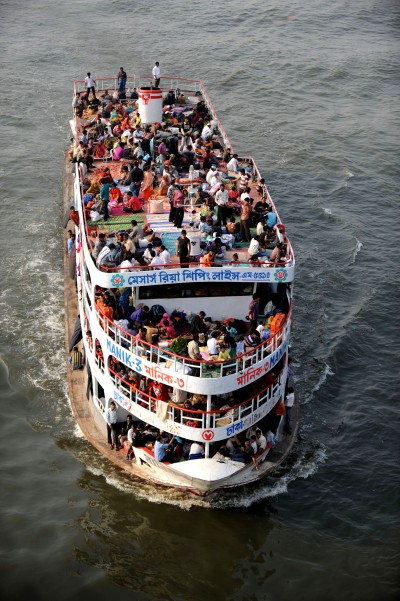 |
| People risk over crowded passenger ships to reach home during Eid. Image by Maji, copyright Demotix (26/11/2009). |
A passenger ship with people bound for home during Eid was submerged (in 2009) due to extra load. Hundreds of people died. Each year during the time of Eid, Buses, trains and ships carry extra passengers. The government do not take any step to prevent these. The general public do not follow pre-cautions which lead to deaths. But the government cannot avoid its responsibilities. Proper investigation should be carried out to find out the people responsible for the negligence.But every year the situation remains the same. As the travelers are greater in numbers comparing to the transports available, people have no choice to take risks to go home during Eid.
Nasirudding Hozza [bn] concludes:
Eid celebrated with family is filled with a lot of happiness because of the struggle to reach home.The post was originally written by Bijoy and was translated by me for Global Voices Online.
Subscribe to:
Comments (Atom)


















